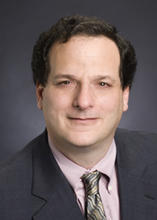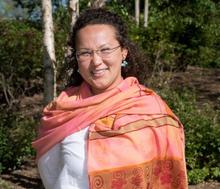Hurricane Maria Team
National Construction Safety Team

Joseph Main (Lead)
Dr. Joseph A. Main is a research structural engineer in the Structures Group of the Materials and Structural Systems Division (MSSD) of the Engineering Laboratory (EL) at the National Institute of Standards and Technology (NIST). He completed his Ph.D. in Civil Engineering at Johns Hopkins University in 2002 and joined the Structures Group in January 2005 as a National Research Council Postdoctoral Research Associate. Dr. Main's research interests relate to the evaluation of structural performance under extreme loads, including wind, fire, and local damage scenarios. Dr. Main serves as Team Lead for the NIST Hurricane Maria Program, and Lead Technical Investigator of the National Construction Safety Team (NCST) investigating the impacts of Hurricane Maria on Puerto Rico. He also leads an NCST project focused on the performance of critical buildings in Hurricane Maria.

Maria Dillard (Associate Lead)
Dr. Maria Dillard is a Research Social Scientist for the National Institute of Standards and Technology’s Community Resilience Group. Her research is focused on community response to hazards and chronic stressors and the development of methods for measurement and modeling community resilience, recovery, well-being, and vulnerability. Dr. Dillard serves as Associate Team Lead for the NIST Hurricane Maria Program and Associate Lead Technical Investigator of the National Construction Safety Team (NCST) investigating the impacts of Hurricane Maria on Puerto Rico. She also leads a National Windstorm Impact Reduction Program (NWIRP) project in the Hurricane Maria Program that examines the recovery of the services provided by schools and hospitals and the role of these social institutions in the recovery of communities following disasters.

Luis D. Aponte-Bermúdez
Luis D. Aponte-Bermúdez is a Professor at the University of Puerto Rico Mayagüez Engineering Program in the Civil Engineering and Surveying Department. He has also worked as a private consultant in structural design and assessments since 2006. He received a B.S. in Civil Engineering in 2000 from the University of Puerto Rico Mayagüez, and MSCE and Ph.D. in the area of structures from the University of Florida in 2004 and 2006, respectively. He was a member of the FEMA Mitigation Assessment Team in Puerto Rico after hurricanes Irma and Maria (2017) and local lead of the FEMA funded project to Develop the Special Wind Region Maps (Microzoning Maps) adopted in the Puerto Rico Building Code 2018. Dr. Aponte also participated in a FEMA Pre-MAT field deployment after the 6.5-magnitude PE Earthquake of January 7, 2020. Additionally, he is a specialist in Numerical Weather Prediction to simulate extreme weather events using the Weather Research and Forecasting model, Computational Fluid Dynamics, and Artificial Neural Network applications applied to wind-related issues. Dr. Aponte is a member of the National Construction Safety Team Technical Investigation of Hurricane Maria and its impacts on Puerto Rico. Within the Hurricane Maria Program, Dr. Aponte is characterizing the hazard environment and studying the performance of critical buildings, such as hospitals, schools, and shelters, under two NCST projects.

Joel Cline
Joel Cline is the Coordinator for the Tropical Program at the National Weather Service (NWS) Headquarters. He has worked for the National Hurricane Center in Miami for nine hurricane seasons, including Hurricane Andrew, and for several years at a Weather Forecast Office in Raleigh, NC, all as a lead forecaster. Joel was a forecaster for the 1999 World Games of the Special Olympics, the 2001 World Cup, and the 2002 Winter Olympic Games and Paralympics in Salt Lake City. He was a project manager for Operational Weather Services for the NWS Pacific Region and worked with wildfire crews while forecasting on site, and he led the tropical program and tsunami services after the 2004 Indonesian Tsunami. He has also led the DOE Renewable Energy effort to improve forecast models on the same scales for wind, solar and water energy efforts. Joel holds two BS degrees from NC State University in Meteorology and Computer Science, two MS degrees from University of Miami in Meteorology and Physical Oceanography, and an honorary Ph.D. from Texas Tech University. He is a member of the National Construction Safety Team (NCST) for the NIST Technical Investigation of Hurricane Maria’s Impacts on Puerto Rico. Within the Hurricane Maria Program, Joel is involved in an NCST project that focuses on investigating the role of emergency communications in public response for those under imminent threat, and he is also contributing to an NCST project focused on hazard characterization for Hurricane Maria.

Jazalyn Dukes
Dr. Jazalyn Dukes is a Research Structural Engineer in the Earthquake Engineering Group at the National Institute of Standards and Technology (NIST). Her research interests include probabilistic analysis methods, finite element modeling, seismic retrofit of structures using fiber reinforced composites, and multi-hazard reconnaissance studies. Dr. Dukes is also a member of the National Construction Safety Team (NCST) for the Technical Investigation of Hurricane Maria’s Impacts on Puerto Rico. Within the Hurricane Maria Program, Dr. Dukes is involved in an NCST project characterizing the performance of critical buildings and a National Windstorm Impact Reduction Program (NWIRP) project focused on distributed infrastructure.

Gina Eosco
Dr. Gina Eosco is a social scientist and risk communication expert supporting NOAA’s Weather Program Office (WPO) as the WPO Social Science program manager. Dr. Eosco’s focus is on prioritizing social and behavioral science (SBS) research needs within the weather community, determining ways to translate social science research into application, and learning from operational meteorologists and practitioners to understand the next research challenge. She is a member of the National Construction Safety Team (NCST) for the NIST Technical Investigation of Hurricane Maria’s Impacts on Puerto Rico. Within the Hurricane Maria Program, Dr. Eosco is contributing to an NCST project focused on investigating the role of emergency communications in public response for those under imminent threat.

Kenneth Harrison
Dr. Ken Harrison is an Operations Research Analyst in the Community Resilience Group in the Engineering Laboratory (EL) at the National Institute of Standards and Technology (NIST). Dr. Harrison's research at NIST involves the development of models and decision-support tools for community resilience planning. Dr. Harrison is a member of the National Construction Safety Team (NCST) for the Technical Investigation of Hurricane Maria’s Impacts on Puerto Rico. Dr. Harrison also leads a National Windstorm Impact Reduction Program (NWIRP) project in the Hurricane Maria Program that examines the impacts to recovery of distributed infrastructure supporting critical buildings and emergency communications.

Jennifer Helgeson
Dr. Jennifer Helgeson is a Research Economist in the Applied Economics Office of the Engineering Laboratory (EL) at the National Institute of Standards and Technology (NIST). She currently leads the office's work on the "Economics of Community Resilience Planning." Her research interests are focused around survey assessments and economic analyses that consider behavioral aspects and approaches to dealing with environmental issues. Dr. Helgeson is a member of the National Construction Safety Team (NCST) Technical Investigation of Hurricane Maria and its impacts on Puerto Rico. Dr. Helgeson also leads National Windstorm Impact Reduction Program (NWIRP) project in the Hurricane Maria Program that examines the impacts to and recovery of small and medium-sized manufacturers (SMMs), and retail and service industries.

Katherine Johnson
Dr. Katherine Johnson (Jo) is a Social Scientist and Earthquake Risk Mitigation Policy Analyst in the Earthquake Engineering Group within the Engineering Laboratory at the National Institute of Standards and Technology (NIST). Dr. Johnson is a natural hazards social scientist with experience in a long-term collaborative project to build resilience in a rural and low-lying coastal social-ecological system on Maryland’s Chesapeake Bay. Within the Hurricane Maria Program, Dr. Johnson leads an NCST project that focuses on investigating the role of emergency communications in public response for those under imminent threat. She also contributes to a NCST project characterizing the performance of critical buildings.

Thomas Kirsch
Dr. Thomas Kirsch is a board-certified emergency physician and expert in disaster management and science, austere medicine and health care management. He is an Adjunct Professor of Emergency Medicine in the George Washington University School of Medicine and Health Sciences. He was previously the Director of the National Center for Disaster Medicine and Public Health (NCDMPH) and a Professor of Military and Emergency Medicine at the Uniformed Services University of the Health Sciences. Prior to his role at NCDMPH, he was a Professor of Medicine (Emergency Medicine), Public Health (International Health) and Engineering (Civil Engineering) at Johns Hopkins University. Dr. Kirsch is a member of the National Construction Safety Team (NCST) Technical Investigation of Hurricane Maria and its impacts on Puerto Rico. Within the Hurricane Maria Program, Dr. Kirsch is assessing the technical conditions associated with deaths and injuries that resulted from Hurricane Maria.

Marc Levitan
Dr. Marc Levitan researches tornadoes and hurricanes, their impacts, and mitigation for the National Windstorm Impact Reduction Program (NWIRP), a multi-agency program whose purpose is to achieve major measurable reductions in the losses of life and property from windstorms. Dr. Levitan served as the first Director (Acting) of NWIRP, from 2015-2018. He was also the Lead Investigator for the National Construction Safety Team (NCST) Technical Investigation of the 2011 Joplin Tornado. He currently leads implementation activities for many of the recommendations resulting from these tornado studies. Dr. Levitan is a member of the National Construction Safety Team Technical Investigation of Hurricane Maria and its impacts on Puerto Rico. Within the Hurricane Maria Program, Dr. Levitan is characterizing the wind environment and studying the performance of critical facilities, such as hospitals, schools and shelters, under two NCST projects. He is also studying the causes of the loss of functionality and extended-duration outage of the wireless communication system under an NWIRP project.

Judith Mitrani-Reiser
Dr. Judith Mitrani-Reiser is the Associate Chief of the Materials and Structural Systems Division (Engineering Laboratory) of the National Institute of Standards and Technology (NIST). The Division includes four research groups: Community Resilience, Earthquake Engineering, Structures, and Infrastructure Materials. The Division also houses three statutory programs: National Construction Safety Team (NCST), National Earthquake Hazards Reduction Program (NEHRP), and the National Windstorm Impact Reduction Program (NWIRP). Mitrani-Reiser provides leadership in the development and coordination of statutory processes for making buildings safer as authorized by various statutes, including the NCST, NWIR, and NEHR Acts. She manages and provides oversight on building failure investigations and coordinates work with other Federal agencies to reduce losses in the United States from disasters and failures of our built environment.

DongHun Yeo
Dr. DongHun Yeo is a research Structural Engineer in the Structures Group of the Materials and Structural Systems Division (MSSD) of the Engineering Laboratory at the National Institute of Standards and Technology. His present research includes Computational Fluid Dynamics (CFD) simulations and wind tunnel testing for structural engineering applications, uncertainty quantification in experimental and numerical simulations, structural reliability, advanced design of high-rise buildings for wind, extreme wind climatology, and fluid-structural interactions. Dr. Yeo is a member of the National Construction Safety Team (NCST). Within the Hurricane Maria Program, Dr. Yeo is the leader of an NCST project focused on hazard characterization, including investigation of topographic effects on the wind environment using CFD, wind tunnel studies, and field measurements. He is also involved in an NCST project focused on the performance of critical buildings in Hurricane Maria.
Technical Staff

Kelly Anderson
Kelly Anderson is a Research Social Scientist in the Community Resilience Group of the Materials and Structural Systems Division of the Engineering Laboratory (EL) at the National Institute of Standards and Technology (NIST). She received her Ph.D. in Geographical Sciences from the University of Maryland (College Park) in 2021 and her B.S.B.A. degree from the University of Florida in Economics in 2010. Dr. Anderson’s research interests include poverty, urbanization, and the effects of climate change on environmentally vulnerable and economically marginalized communities of the developing world. She has worked on a range of topics related to the social impacts of extreme weather, including changes to education and healthcare access, viability of rural and urban livelihoods, and migration. Within the Hurricane Maria Program, Dr. Anderson has worked since May 2020 on a National Windstorm Impact Reduction Program (NWIRP) project focused on the recovery of services provided by schools and hospitals and the role of these social institutions in the recovery of communities.

Kurtis Goad
Kurtis Goad is a Research Social Scientist in the Community Resilience Group of the Materials and Structural Systems Division of the Engineering Laboratory (EL) at the National Institute of Standards and Technology (NIST). He holds a Master's Degree in Human Factors and Applied Cognition and a B.A. in Psychology from George Mason University. Within the Hurricane Maria Program, Mr. Goad is involved in a National Construction Safety Team (NCST) project investigating the role of emergency communications, among other factors, in public response for those under imminent threat from Hurricane Maria.

Emina Herović
Dr. Emina Herović is a Research Social Scientist in the Materials and Structural Systems Division of the Engineering Laboratory at the National Institute of Standards and Technology (NIST). Prior to working at NIST, Dr. Herović served as an Assistant Clinical Professor of Communication at the University of Maryland (UMD), where her research and teaching focused on the social responses and implications of risk, crisis, and disasters. She also worked on several projects focused on building resilience to large scale catastrophes at the National Academies of Sciences, Engineering, and Medicine. Within the Hurricane Maria Program, Dr. Emina Herović is involved in a National Construction Safety Team (NCST) project that focuses on investigating the role of emergency communications (among other factors) in public response for those under imminent threat.

Nathan McKinney
Nathan McKinney is a geographer in the Structures Group of the Materials and Structural Systems Division of the Engineering Laboratory at the National Institute of Standards and Technology (NIST). Mr. McKinney holds M.S. and B.S. degrees in Environmental Science from the University of West Florida and is a certified GIS Professional (GISP). Before joining NIST in 2023, he worked as the GIS Labs Manager in the Department of Geography and Sustainability at the University of Tennessee. Within the Hurricane Maria Program, Nathan provides geospatial support and expertise for both the National Construction Safety Team (NCST) Technical Investigation and the National Windstorm Impact Reduction Program (NWIRP) Research Study of Hurricane Maria’s impacts on Puerto Rico.
Institutional Support
Regina Avila
Regina Avila is a Digital Services Librarian and Data Librarian at the National Institute of Standards and Technology. She joined NIST in 2009 to implement the agency’s NIST Digital Archives, leading a team in the digitization and preservation of the agency’s publications. Since then her duties have included leading a library team to investigate research data management services. As a Data Librarian, she successfully collaborated with NIST's IT department and laboratories in curating and publishing research data including the development of tools to create data management plans, the NIST enterprise data inventory, and data documentation. Within the Hurricane Maria Program, Ms. Avila supports data management and curation activities.

Keith Martin
Keith Martin is a Librarian at the National Institute of Standards and Technology Research Library, where he serves as a liaison to the NIST Engineering Laboratory. Mr. Martin has a M.S. in Library and Information Science from Simmons University and joined NIST in 2001. Within the Hurricane Maria Program, Mr. Martin provides customized research to support the information needs of the Hurricane Maria team.
NIST Associates

Dereka Carroll-Smith
Dr. Dereka Carroll-Smith is a Postdoctoral Research Associate with the NIST Professional Research Experience Program (PREP) at the University of Maryland-College Park. She also holds a joint appointment as a Program Coordinator and Adjunct Professor in the Department of Chemistry, Physics, and Atmospheric Sciences at Jackson State University, and as a Visiting Scientist in the Mesoscale and Microscale Meteorology division at the National Center of Atmospheric Research. Dereka received her B.S. in Meteorology from Jackson State University in 2012, her M.S. in Atmospheric Science from Purdue University in 2014, and her Ph.D. in Atmospheric Science from the University of Illinois at Urbana-Champaign in 2018. Her research interests include extreme weather and climate modeling, along with severe weather risk and human impacts modeling. Within the Hurricane Maria Program, Dr. Carroll-Smith is involved in an NCST project focused on the multi-hazard characterization of Hurricane Maria’s impacts, including the challenges associated with measurement of extreme rainfall during the hurricane.
Nico de Toledo
Nico de Toledo is a Professional Research Experience Program (PREP) Research Associate focusing on wind and coastal hazards in the Structures Group of the Materials and Structural Systems Division of the Engineering Laboratory (EL) at the National Institute of Standards and Technology (NIST). With an academic background in geology and expertise in geospatial analysis, his research focuses on learning from the impacts of severe windstorms on critical facilities and infrastructure to improve building codes and standards. Within the Hurricane Maria Program, Mr. de Toledo is contributing to the examination of the role of cellular tower damage in the long-duration telecommunications outage in Puerto Rico for the Recovery of Infrastructure Systems Project and the analysis of shelter performance for the Critical Buildings Project.

Yunjae Hwang
Dr. Yunjae Hwang is a Professional Research Experience Program (PREP) Postdoctoral Fellow in the Materials and Structural Systems Division of the Engineering Laboratory (EL) at the National Institute of Standards and Technology (NIST). He completed his Ph.D. at Stanford University in 2022 with a major in Civil and Environmental Engineering and a minor in Mechanical Engineering. His research interests are focused on wind engineering applications for the development of a safe, healthy and sustainable built environment. Within the Hurricane Maria Program, Dr. Hwang is involved in a National Construction Safety Team (NCST) project focused on hazard characterization, including investigation of the influence of topographic effects on the wind environment. His work in this area involves the development and application of computational fluid dynamics (CFD) techniques for simulation of turbulent boundary layer flow over complex topography, including consideration of the forest canopy.

Jenea Lyles
Jenea Lyles is a Professional Research Experience Program (PREP) Research Associate in the Community Resilience Group and the Hurricane Maria Program within the Engineering Laboratory at the National Institute of Standards and Technology (NIST). Ms. Lyles is a post-graduate research associate at the George Washington University School of Engineering and Applied Science. She received her MPH in Global Health Program Design, Monitoring, and Evaluation from the George Washington University in 2024 and her B.S. in Biological Sciences from the University of Pittsburgh in 2020. Ms. Lyles' research interests include social determinants of health, global burden of disease, and the public health effects of climate change. Within the Hurricane Maria Program, Ms. Lyles contributes to National Windstorm Impact Reduction Program (NWIRP) projects studying the recovery of business and supply chains and the impacts to and recovery of infrastructure systems supporting critical buildings and emergency communications.

Alizabeth M. Sánchez-López
Dr. Alizabeth M. Sánchez-López is a research and programs consultant, and professor with over 15 years of experience. Her research focuses on entrepreneurial ecosystems, innovation in STEM disciplines and business resilience. Dr. Sánchez-López has led research to improve the competitiveness and capacity of Small and Medium Enterprises (SMEs) in Puerto Rico in collaboration with industry associations, economic development agencies and other non-government organizations (NGOs). As PREP Research Faculty in NIST’s Applied Economics Office, Dr. Sánchez-López contributes to the National Windstorm Impact Reduction Program (NWIRP) on the project: Recovery of Business and Supply Chains Post-Hurricane Maria. The project examines the impacts to and recovery of small and medium-sized enterprises (SMEs) in the manufacturing, retail, and service industries. Also, the study evaluates interdependencies, more specifically the vulnerabilities, impact, and resilience of the transportation and shipping sectors in Puerto Rico.
Former Contributors

Benjamin Davis
From February 2018 to May 2023, Benjamin Davis was a Management and Program Analyst in the Disaster and Failure Studies Program in the Materials and Structural Systems Division (MSSD) of the Engineering Laboratory (EL) at the National Institute of Standards and Technology (NIST). While in MSSD, Ben served as the Designated Federal Officer (DFO) for the National Construction Safety Team (NCST) Advisory Committee, which advises NIST on how to execute the NCST Act. As a member of the National Construction Safety Team under the Hurricane Maria Program, Ben provided project management, communications, and contract management support for the Hurricane Maria Program.

Zeinab Farahmandfar
From February 2020 to August 2024, Dr. Zeinab Farahmandfar was a Professional Research Experience Program (PREP) research scientist in the Community Resilience group in the Engineering Laboratory at the National Institute of Standards and Technology (NIST). Within the Hurricane Maria Program, Dr. Farahmandfar conducted research on infrastructure-related aspects as part of a National Windstorm Impact Reduction Program (NWIRP) project.

Erica Kuligowski
From February 2018 to February 2020, Dr. Erica D. Kuligowski served as Team Lead for the NIST Hurricane Maria Program and Lead Technical Investigator of the National Construction Safety Team (NCST) investigating the impacts of Hurricane Maria on Puerto Rico, as well as leader of an NCST project that focuses on investigating the role of emergency communications in public response for those under imminent threat. Dr. Kuligowski is a research social scientist and holds a Ph.D. in Sociology from the University of Colorado at Boulder, as well as a B.S. and M.S. in Fire Protection Engineering from the University of Maryland, College Park.

Jarrod Loerzel
From March 2019 to October 2023, Jarrod Loerzel was a Research Social Scientist for the National Institute of Standards and Technology’s Community Resilience Group. Within the Hurricane Maria Program, Mr. Loerzel supported a National Windstorm Impact Reduction Program (NWIRP) project examining the recovery of the services provided by schools and hospitals and the role of these social institutions in the recovery of communities following disasters.

Cynthia Rivas
From April 2019 to October 2022, Cynthia Rivas was a geographer in the Structures Group of the Materials and Structural Systems Division (MSSD) of the Engineering Laboratory (EL) at the National Institute of Standards and Technology (NIST). She provided geospatial support and expertise for the Hurricane Maria Program, including the National Construction Safety Team (NCST) Technical Investigation of Hurricane Maria’s impacts on Puerto Rico.

Alfredo Roa-Henriquez
From September 2019 to December 2021, Dr. Alfredo Roa-Henriquez was a Professional Research Experience Program (PREP) Postdoctoral Fellow and Research Economist in the Applied Economics Office at the National Institute of Standards and Technology (NIST). Within the Hurricane Maria Program, Dr. Roa-Henriquez conducted research in support of a National Windstorm Impact Reduction Program (NWIRP) project that examines the impacts to and recovery of small and medium-sized manufacturers (SMMs), and retail and service industries.

Raphaelle Rodzik
From July 2018 to March 2019, Raphaelle H. Rodzik supported the NIST Hurricane Maria Program as a Project Coordinator with the National Center for Disaster Medicine and Public Health (NCDMPH). Within the Hurricane Maria Program, Ms. Rodzik’s work supported the National Construction Safety Team (NCST) project characterizing the technical conditions associated with deaths and injuries that resulted from Hurricane Maria.

Rameche Somassoundirame
From November 2020 to November 2021, Dr. Rameche Candane Somassoundirame was a Professional Research Experience Program (PREP) research scientist in the Engineering Laboratory (EL) at the National Institute of Standards and Technology (NIST). Within the Hurricane Maria Program, Dr. Somassoundirame’s work supported the National Construction Safety Team (NCST) project focused on hazard characterization, and he performed Computational Fluid Dynamics (CFD) analyses of wind flow over complex topography in Puerto Rico.

Emily Walpole
From June 2019 to October 2023, Dr. Emily Walpole was a research social scientist in the Community Resilience Group of the Materials and Structural Systems Division of the Engineering Laboratory (EL) at the National Institute of Standards and Technology (NIST). Within the Hurricane Maria Program, Dr. Walpole supported a National Construction Safety Team (NCST) project focused on investigating the role of emergency communications (among other factors) in public response for those under imminent threat from Hurricane Maria.

Scott Weaver
From March 2018 to August 2023, Dr. Scott J. Weaver was Director of the National Windstorm Impact Reduction Program (NWIRP) in the Engineering Laboratory at the National Institute of Standards and Technology (NIST). Dr. Weaver was also a member of the National Construction Safety Team (NCST) Technical Investigation of Hurricane Maria and its impacts on Puerto Rico. Within the Hurricane Maria Program, he was the Associate Leader of an NCST project focused on the multi-hazard characterization of Hurricane Maria’s impacts, including the technical conditions associated with the wind environment and other hazards, such as rainfall, flooding, storm surge, and landslides.

Camila Young
From February 2019 to August 2024, Dr. Camila Young was a Research Social Scientist in the Structures Group of the Materials and Structural Systems Division (MSSD) of the Engineering Laboratory (EL) at the National Institute of Standards and Technology (NIST). Within the Hurricane Maria Program, Dr. Young supported a National Construction Safety Team (NCST) project characterizing the performance of critical facilities, such as hospitals, schools, and shelters.

Tingting Zhao
From November 2019 to April 2021, Dr. Tingting Zhao was a PREP Fellow and Research Scientist in the Community Resilience Group at the National Institute of Standards and Technology (NIST) focusing on critical infrastructure resilience, including transportation, water distribution, and power systems. Within the Hurricane Maria Program, Dr. Zhao conducted research as part of a National Windstorm Impact Reduction Program (NWIRP) project characterizing the performance of critical infrastructure and investigating countermeasures to enhance community resilience through preparedness and restoration.
Contacts
Media Contact
-
(301) 975-6343
-
ALL OTHER INQUIRIES

